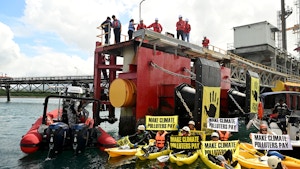Kebijakan & Keuangan Berita

Kebijakan & Keuangan
COP29 action plan thrusts climate finance to the fore
United Nations climate summit president Mukhtar Babayev highlights the new climate finance target as top priority for the November talks. Will Azerbaijan be able to get the dealmakers, including China, to agree on a price to pay to help developing countries adapt to climate change?

Karbon & Iklim
Seeing mangroves regrow: A visual story on the surprise resurgence of Iloilo’s coastal forests
On International Day for the Conservation of the Mangrove Ecosystem, Eco-Business looks at the unexpected rapid growth of a thriving mangrove forest in Iloilo City, Philippines, following the completion of a man-made floodway.

On June 15, the government of Pará state in Brazil gave the green light for the construction of the new Avenida Liberdade highway in the state capital, Belém, that will split up two conservation areas and run past a traditional Afro-Brazilian community.

Kebijakan & Keuangan
Mandy Rambharos named new Verra chief, pledges strong governance
The world’s largest carbon credit certifier has been updating its methods used to verify forest projects in a bid to regain market trust following controversy early last year.
Kebijakan & Keuangan
GIC doubles down on climate tech amid market slump
Kebijakan & Keuangan
Q&A: What China’s push for ‘new quality productive forces’ means for climate action
Pangan & Agrikultur
Climate and finance crises could leave 600 million hungry by 2030
Kebijakan & Keuangan Opini

Kebijakan & Keuangan
Rich countries must meet their biodiversity financing pledges
Two years ago, developed countries pledged at least US$20 billion annually by 2025 to help preserve 30 per cent of the world’s land and oceans. But most countries have failed to contribute their fair share.

Kebijakan & Keuangan
Climate litigation can power China’s low-carbon transition
Climate litigation is steadily growing in China, but a different approach from the Global North, involving the proactive role of state agencies, could be more effective in ensuring compliance with climate policies across local governments.

There are growing calls for more corporate disclosure, but if firms release sustainability reports just to meet the needs of external stakeholders, including regulators, it is unlikely to motivate internal changes to business operations.

Karbon & Iklim
Why carbon capture and storage is not the solution
Carbon capture and storage has been hailed as a potential way to reduce emissions, but it is more likely to increase them by boosting oil and gas extraction. The cheaper and more effective solution is to move to cleaner forms of energy.
Pangan & Agrikultur
Vietnam’s rice land restrictions: Time for a rethink?
Pangan & Agrikultur
AI can transform global food security and climate action
Kebijakan & Keuangan Video

Studio EB
From sponge cities to coastal forests, Asia is seeking ways to work with nature and prepare for the risks in a warmer-than-expected future. This Eco-Business video looks at what else cities need to do to strengthen climate resilience.

Kebijakan & Keuangan
Once oil seeker, now deep-sea researcher: Mapping the unknown with OceanXplorer
The vessel will scour Southeast Asia’s marine environment to gather data and support local conservationists.

Karbon & Iklim
Greenpeace activists block Shell facility in Philippine port to demand climate reparations
The action comes despite the oil giant suing the environmental group for US$2.1 million after demonstrators boarded the company’s vessel at the Atlantic Ocean in January.

Kebijakan & Keuangan
‘Environmental defenders are the glue of the Philippines’ democracy’: Delikado director Karl Malakunas
The veteran journalist talks to Eco-Business about how his Emmy-nominated documentary depicts the lives of environmental crusaders in Asia's deadliest country for guardians of the seas and forests.
Kebijakan & Keuangan Podcasts

Kebijakan & Keuangan
Former Verra veteran envisions an unshackled carbon market and a new endgame
David Antonioli says current rules spur piecemeal offsetting instead of enabling faster growth of climate ventures. He expects pushback to his ideas in a market polarised over integrity issues, but wants players to think big-picture.

Karbon & Iklim
‘Five years ago, everyone wanted to be Elon Musk’: Where is climate tech in Southeast Asia now?
Entrepreneur Steve Melhuish tells the EB Podcast where the biggest opportunities to reduce emissions and make money are in Southeast Asia, and why finding the right economic incentives is critical for climate tech startups.

Kebijakan & Keuangan
COP28 transformed ESG investment narrative in the Middle East: Abu Dhabi Securities Exchange’s strategy chief
ADX's chief strategy and transformation officer Matthias Büchler tells the Eco-Business podcast why sustainability is a key growth strategy and how the COP summit shaped ESG reporting for listed companies on the exchange.

Kebijakan & Keuangan
‘DIY until we die’? LGBTQ rights group on what Singapore’s new leadership means for its movement
LGBTQ people have long had to chart their own paths in the face of discrimination on bread and butter issues, like housing and employment. Pink Dot campaigners tell the Eco-Business Podcast their hopes amid a political leadership refresh.
Kebijakan & Keuangan Rilis Pers

UN Environment Programme (UNEP)
As global crises join forces, world must adopt forward-looking approach to protect human and planetary health

United Nations Development Programme (UNDP)
New joint UN report calls for urgent action to build peaceful, just and inclusive societies to prevent risks to all SDGs

United Nations Economic and Social Commission for Asia and the Pacific (ESCAP)
ESCAP, FDI Center launch pledge to advance gender equality in foreign direct investment

Asian Development Bank (ADB)
ADB raises developing Asia and the Pacific’s economic growth forecast for 2024
Kebijakan & Keuangan Riset

Eco-Business for Temasek's Ecosperity
Ecosperity Week 2024 post-conference report: Renewing our Vibrant Spring

Plastic Credit Exchange (PCX)
How plastic credits are supporting the Global Plastics Treaty

MioTech
ChatGPT on financial reporting















